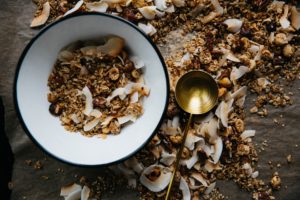“She isn’t gaining enough weight, I’m worried,” said a very frazzled-looking father, immediately as my preceptor and I stepped through the exam room door. We were anticipating this father’s reaction, as we had noted on the growth chart before entering the room that 18-month-old Lily was not gaining weight appropriately.
The physician agreed with the father, showed him Lily’s unimpressive trend on the growth chart, and began reassuring him that all he needed to do was make sure Lily began consuming more calories.
Before she could continue with her usual monologue I had come to expect during these visits, Lily’s father exasperatedly expressed his disbelief that what he fed his daughter was inadequate. His anxious energy was palpable. He continued on and on about his efforts to feed his daughter only the healthiest foods.
He explained that his personal struggle with cancer had motivated him to do what he felt was best for his daughter’s health. He made sure that she was breast-fed for as long as her mother was willing — having researched all about the long-term health benefits of breast milk. He desperately and repeatedly detailed his feeding efforts; words like ‘organic’ and ‘all-natural’ came pouring out of his mouth.
And then, just as all his words were starting to fade together, one phrase caught my attention: low-fat. The physician cut off the father’s speech to ask why he was feeding Lily skim milk and other no- and low-fat foods. Confused, the father explained that he didn’t want his daughter to struggle with her weight as he had his whole life.
The pediatrician and I explained the importance of fats for Lily’s brain development. Eventually, we successfully convinced the father to include healthy sources of fat into his daughter’s diet.
It struck me that someone who had quoted research about the positive effects of breast-feeding on a child’s health and who so desperately wanted to do a good job at setting his daughter up for a healthy, successful life, could simultaneously be so confused about the nutritional needs of his child.
I found myself having two very strong reactions to this encounter: A heavy sadness washed over me as I thought about the fact that this father’s ignorance represents our society’s severe lack of nutritional knowledge. Most patients seem to genuinely not know how to properly fuel their own bodies or their children’s. I was also bothered by the limited knowledge with which physicians are equipped to give these patients dietary advice, perpetuating the vicious cycle.
While I recommended avocados, olive oil, and nut or seed products as sources of healthy fats to this father, my preceptor recommended adding more full-fat dairy products to Lily’s diet. While that will certainly increase her fat intake and help her gain weight, I struggle with the potentially harmful effects of that recommendation. Dairy products are praised and pushed on kids as important sources of calcium and vitamin D, totally ignoring that dairy products, especially cheese, are huge sources of saturated fats.
As our society struggles with obesity, heart disease, inflammatory diseases, and other chronic disease, why do most physicians still recommend that children consume so much dairy? In the same light, why is red meat still the default recommendation when someone is iron deficient, even though the consumption of red meat is a known risk for so many diseases, including cancer?
In every other field of medicine, we are taught to practice evidence-based medicine. Why, then, do we tend to still rely on these outdated nutritional defaults that have been scientifically proven to have adverse effects on our health? If we do not inform patients, how can we expect them to know that so much saturated fat and cholesterol consumption may increase the risk of developing atherosclerotic lesions earlier in life, or that processed meats like cold cuts and hot dogs may increase their risk for developing colorectal cancer?
As I enter the health care field, my hope is that more physicians use evidence-based nutritional knowledge to encourage their patients to properly nourish their bodies. If we could spend even half as much time learning about nutrition in medical school as we do pharmacology, perhaps our health care model would rely more on food as the medicine to prevent disease and less on the drugs that treat the consequences of not doing so. I am passionately hopeful that this shift will occur, since without it our patients’ health is truly suffering.
Author’s note: The patient’s name has been changed for confidentiality purposes.
- Stories From The Wards: Is Pediatric Nutrition Advice Outdated? - March 17, 2018




